Somali refugee community sows hope in Dadaab
The boys who came as Somali refugees in 1991 now tell the stories of a new generation of refugees.
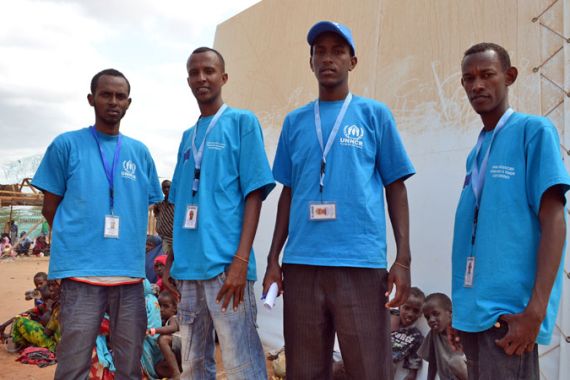
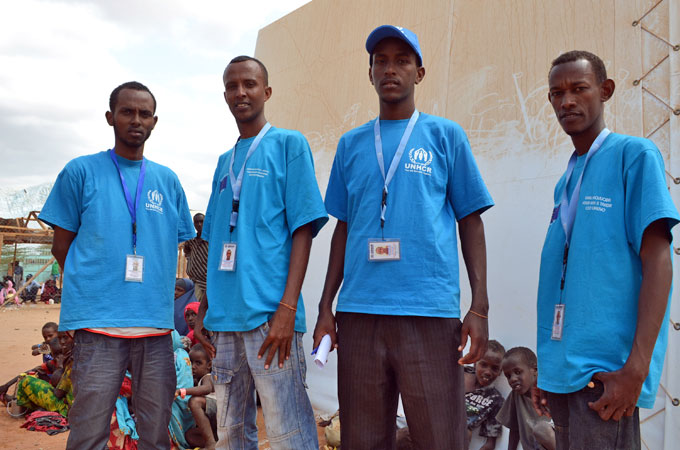 |
| The lost boys of Somalia now help tell the stories of a new generation of Somalia refugees [Azad Essa/Al Jazeera] |
Twenty years ago, tens of thousands of Somalis fled into Kenya as their country erupted into a bloody civil war that continues to this day.
The Dadaab refugee complex, made up of three camps – Dagahaley, Ifo and Hagerdaley – was initially built as a temporary measure to house the influx of refugees in the early 1990s.
But with peace in Somalia proving to be elusive, these refugees have had little choice but to remain in the camps, and make a life for themselves.
For 20 years, Somalis escaping famine or war have continued to trickle into Kenya, but a devastating drought, described as the worst in decades, has sparked a new exodus.
There are around 1,500 new arrivals every day. Over the past month, more than 20,000 have arrived, pushing the numbers of refugees in the complex to over 380,000 in an area designed to accommodate just 90,000.
In a twist of fate, young men and women who arrived as two- and three-year-old refugees in 1991 themselves, are now in the thick of things; working as relief workers and interpreters, assisting in the documentation of new arrivals from Somalia.
They are the children of the two decade old crisis now dealing with a new generation of displaced countrymen and women.
Al Jazeera’s Azad Essa caught up with four young men who grew up in Dadaab as refugees and now work as interpreters with the UNHCR to discuss a conflict that has gone on for 20 years.
|
Aden Abdi Ali, 22 |
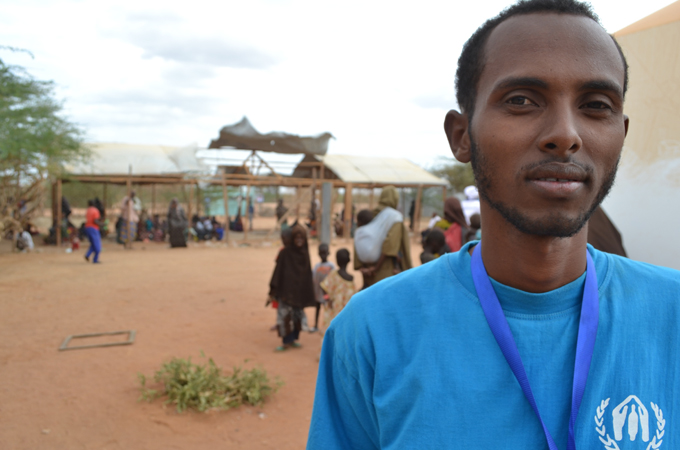 |
I was two-years-old when I came here, now I am 22.
The life we lead here is very challenging, but with some effort, we are able to make it.
The UNHCR provides shelter and food, and these are the basic needs for life.
Some people gain support from the local community and do okay … and the UNHCR offers resettlement opportunities, to move to a developed country.
And if you are lucky enough, you can be chosen to be resettled somewhere else.
But I am happy to be able to help my people as they arrive. I am one of the lucky ones.
Most children go to the primary schools here [in the camps] when they are six years old, but most have to leave by the eight standard, because getting into secondary school is very challenging.
As a result, most of my friends, the youth I grew up with, are unemployed and suffering and struggling.
Most of the youth in the camp are battling because there is little work available, and the chance of getting into college after school is extremely hard. It is very limited. Every year, one or two from the 300 graduates of the high school here get selected for higher studies.
I am glad that I contribute as an interpreter and I hope that these children grow up to service their people as well.
I must admit that we are all very scared by the ongoing situation in Somalia.
Every now and then over the past 20 years we expected peace to come in some form, but we don’t see it coming any more.
We are just very worried by the situation as it stands.
|
Shillow Yusuf, 22 |
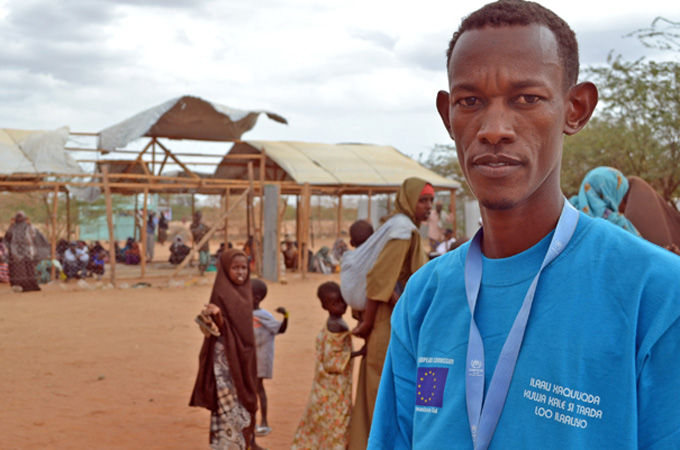 |
When I compare my life now to these new arrivals, I have mixed feelings.
On one hand, I feel happy, that after coming here as a child and after 20 years of refugee life I am an employed man, working for his community, providing any service required.
I feel happy to say that.
When I look at it from the other angle, it is extremely sad, it is a situation I was once in myself, and I know what they must be feeling.
The influx is crazy, and I know that nothing more can be done for them, that is not already being done for them at the moment.
This includes shelter, bedding and other necessities, like giving them medication.
In this situation, the environment is not helpful. It is hot and dusty during the day and it is cold at night.
If you go to the outskirts of the camp, some 2,000 to 3,000 people come daily. They don’t have a place to sleep, or food to eat. And daily, children are reported to die at the hospitals.
Some members of the community in the camps, including the religious leaders, have tried to help because they know that it takes time for the agencies to provide basic essentials. Often, the demands and expectations
people have when they are coming here are not met immediately.
We hope that the international community is going to react, so these lives can be saved.
|
Mohamed Yusuf Hassen, 24 |
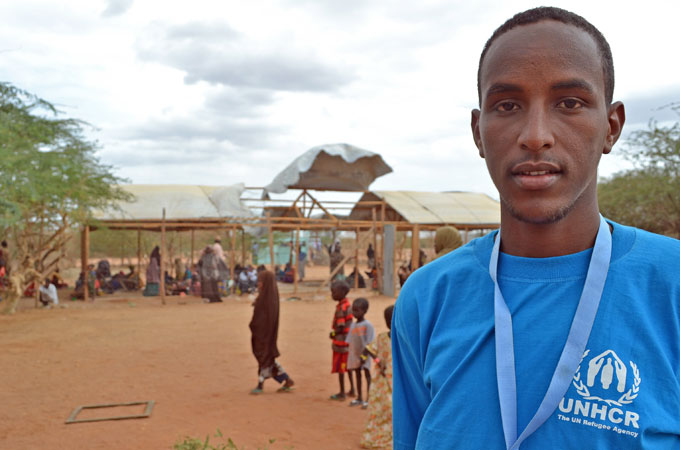 |
I came here in 1991, with my mother and father as a refugee. The only thing I remember is my mother carrying me here.
I was three years at the time and I do remember the kids that grew up with me in the same block in the camp I live.
I work as an interpreter to sustain my life in the camp, as well as to service my community who are in need of help as they arrive from their journey from Somalia.
I try to help them in whatever way I can, including working as an interpreter.
When I grow up, I want to be a politician [back home] in Somalia.
I think the best way to help our country is to go back and build it. It is up to us even if we didn’t finish school.
I think if 20 years from now, these children [who have just arrived] become interpreters for more Somali refugees leaving the country, it would be a disaster.
The world will hate us. We have been helped, we have been fed for the past 20 years.
Another 20 years of this would tell the international community that we are not people capable of peace.
I am hoping that politicians can create a space for people to return [because] the best way is not to go to Europe or America, the best way is to go back our country and to help build it.
|
Abdur Rahman Elmoge, 22 |
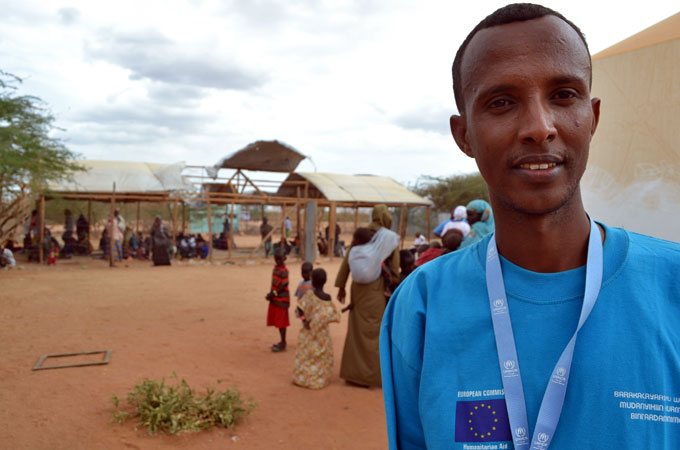 |
I came here when I was two years old, in 1991.
I can’t remember what it was like to stand here as a two-year-old … but if I had to compare the situation today with the situation over the past 20 years, I’d say that there aren’t significant differences.
We still face the same problems that we faced over the past 20 years. This has not changed.
I went to secondary school and completed my schooling life, and now I am an interpreter.
I think that the people who are coming in [now] are extremely vulnerable.
You see children without mothers or fathers, some lost them even on the way here. You also see some old people who are so old they are not able to see, and so we try to assist [all of] them.
We are thankful to the international agencies who are helping my people [but] I just pray to God that we can all go back to Somalia one day in peace.
As a person who has also come here as a refugee, I know what they are feeling … [but] when we came, there was no one to assist us, no one who knew what our needs might be; we all just came in one go … at least they have some people to help them.
I want these children to grow up and be the generation of tomorrow.
If the different factions can get back to the negotiating table, then perhaps these children can return to their home country.